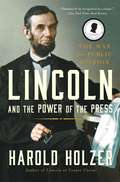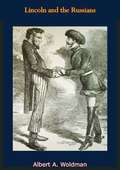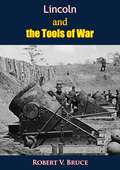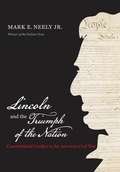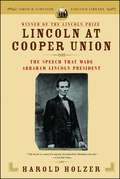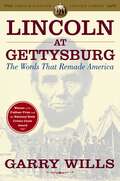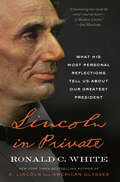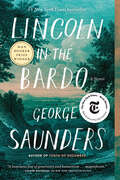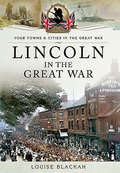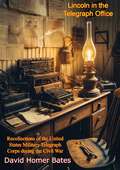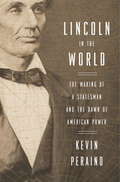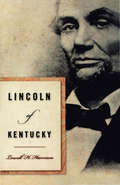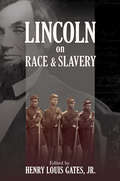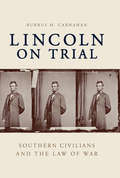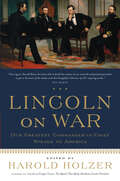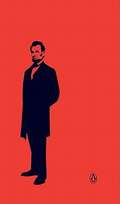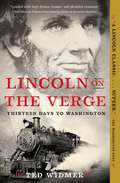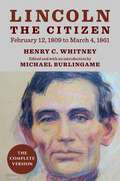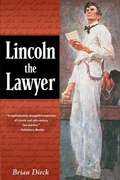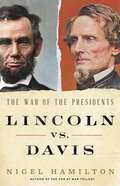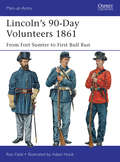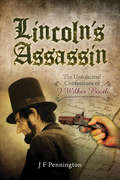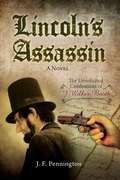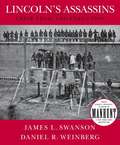- Table View
- List View
Lincoln and the Power of the Press: The War for Public Opinion
by Harold Holzer<P>From his earliest days, Lincoln devoured newspapers. As he started out in politics he wrote editorials and letters to argue his case. He spoke to the public directly through the press. He even bought a German-language newspaper to appeal to that growing electorate in his state. Lincoln alternately pampered, battled, and manipulated the three most powerful publishers of the day: Horace Greeley of the New York Tribune, James Gordon Bennett of the New York Herald, and Henry Raymond of the New York Times. <P> When war broke out and the nation was tearing itself apart, Lincoln authorized the most widespread censorship in the nation's history, closing down papers that were "disloyal" and even jailing or exiling editors who opposed enlistment or sympathized with secession. The telegraph, the new invention that made instant reporting possible, was moved to the office of Secretary of War Stanton to deny it to unfriendly newsmen. <P>Holzer shows us an activist Lincoln through journalists who covered him from his start through to the night of his assassination--when one reporter ran to the box where Lincoln was shot and emerged to write the story covered with blood. In a wholly original way, Holzer shows us politicized newspaper editors battling for power, and a masterly president using the press to speak directly to the people and shape the nation.
Lincoln and the Russians
by Albert A. WoldmanTHE STORY OF LINCOLN AND RUSSIA—VIRTUALLY AN UNKNOWN CHAPTER IN THE LINCOLN SAGALincoln and the Russians, first published in 1952, is the first volume to explore extensively a much neglected aspect of American diplomatic relations: American-Russian relations prior to the First World War. It is only since the Russian Revolution of 1917 that emphasis has been placed on the subject of American-Russian diplomacy; yet Russia played an important part in achieving Lincoln’s goal in the Civil War: the preservation of Union. Although the purchase of Alaska is a familiar story, the story preceding it reveals an aspect of history in which Russia contributed materially toward preventing British and French recognition of and aid to the confederacy.Author Albert A. Woldman has investigated thoroughly the reports to St. Petersburg of Eduard de Stoeckl, Russian Minister to the United States. He has quoted much of the correspondence which passed between the American and Russian diplomatic forces, and the result is a unique contribution to Americana and Lincolniana.
Lincoln and the Tools of War
by Robert V. Bruce Benjamin P. ThomasFirst published in 1956, this is an account of the arming of the Union forces in the Civil War, and of Lincoln’s part in it. It has never been told in any comprehensive way before, and shows Lincoln in a new and engaging light.Lincoln was determined to win the war, yet his generals seemed unable to give him a victory, so he reasoned that a more efficient weapon would have to be invented. However, his main opponent, General James W. Ripley, who sat in charge of army ordnance, believed the war would be short and didn’t want a vast supply of expensive arms left over. Standardized guns and ammunition made supplying the troops in the field easier.Lincoln was in the thick of it. He wanted mortar boats to help open the upper Mississippi as they had helped Porter take New Orleans. When he discovered a big snafu had delayed production, one J. D. Mills came to Washington with a crude machine gun that was soon christened the coffee-mill gun.Probably the biggest and longest controversy involved muzzle-loading rifles—favoured by Ripley—and breech-loading rifles—the Soldier’s choice, as he could lie down and load a breechloader at least five times as fast as a muzzle-loader. In addition to these and other standard arms, the inventors offered a wide catalogue of innovations: rockets, steam guns, liquid fire, a submarine, explosive bullets, a proposed poison gas, and so on down to the fantastic.This book is a big American story of Washington in wartime, and it will appeal to everybody who ever had any contact with the armed services. For the specialist, it offers quite a quantity of previously unpublished material. Its biggest merit is, however, that it is just plain fascinating reading, the kind of book no one should start late in the evening if he wants any sleep.
Lincoln and the Triumph of the Nation
by Mark E. NeelyThe Civil War placed the U.S. Constitution under unprecedented--and, to this day, still unmatched--strain. In Lincoln and the Triumph of the Nation, Pulitzer Prize-winning historian Mark Neely examines for the first time in one book the U.S. Constitution and its often overlooked cousin, the Confederate Constitution, and the ways the documents shaped the struggle for national survival.Previous scholars have examined wartime challenges to civil liberties and questions of presidential power, but Neely argues that the constitutional conflict extended to the largest questions of national existence. Drawing on judicial opinions, presidential state papers, and political pamphlets spiced with the everyday immediacy of the partisan press, Neely reveals how judges, lawyers, editors, politicians, and government officials, both North and South, used their constitutions to fight the war and save, or create, their nation. Lincoln and the Triumph of the Nation illuminates how the U.S. Constitution not only survived its greatest test but emerged stronger after the war. That this happened at a time when the nation's very existence was threatened, Neely argues, speaks ultimately to the wisdom of the Union leadership, notably President Lincoln and his vision of the American nation.
Lincoln at Cooper Union: The Speech that Made Abraham Lincoln President
by Harold HolzerLincoln at Cooper Union explores Lincoln's most influential and widely reported pre-presidential address -- an extraordinary appeal by the western politician to the eastern elite that propelled him toward the Republican nomination for president. Delivered in New York in February 1860, the Cooper Union speech dispelled doubts about Lincoln's suitability for the presidency and reassured conservatives of his moderation while reaffirming his opposition to slavery to Republican progressives. Award-winning Lincoln scholar Harold Holzer places Lincoln and his speech in the context of the times -- an era of racism, politicized journalism, and public oratory as entertainment -- and shows how the candidate framed the speech as an opportunity to continue his famous "debates" with his archrival Democrat Stephen A. Douglas on the question of slavery. Holzer describes the enormous risk Lincoln took by appearing in New York, where he exposed himself to the country's most critical audience and took on Republican Senator William Henry Seward of New York, the front runner, in his own backyard. Then he recounts a brilliant and innovative public relations campaign, as Lincoln took the speech "on the road" in his successful quest for the presidency.
Lincoln at Gettysburg: The Words That Remade America
by Garry WillisA contextual analysis of Lincoln's most famous speech.
Lincoln at Gettysburg: The Words that Remade America
by Garry WillsThe power of words has rarely been given a more compelling demonstration than in the Gettysburg Address. Lincoln was asked to memorialize the gruesome battle. Instead, he gave the whole nation "a new birth of freedom" in the space of a mere 272 words. His entire life and previous training, and his deep political experience went into this, his revolutionary masterpiece.By examining both the address and Lincoln in their historical moment and cultural frame, Wills breathes new life into words we thought we knew, and reveals much about a president so mythologized but often misunderstood. Wills shows how Lincoln came to change the world and to effect an intellectual revolution, how his words had to and did complete the work of the guns, and how Lincoln wove a spell that has not yet been broken.
Lincoln in Private: What His Most Personal Reflections Tell Us About Our Greatest President
by Ronald C. White&“A fascinating tour inside the mind—and the heart—of Abraham Lincoln . . . An important and timeless work.&”—Jon Meacham, Pulitzer Prize–winning author of His Truth Is Marching On From the New York Times bestselling author of A. Lincoln and American Ulysses, a revelatory glimpse into the intellectual journey of our sixteenth president through his private notes to himself, explored together here for the first timeA deeply private man, shut off even to those who worked closely with him, Abraham Lincoln often captured &“his best thoughts,&” as he called them, in short notes to himself. He would work out his personal stances on the biggest issues of the day, never expecting anyone to see these frank, unpolished pieces of writing, which he&’d then keep close at hand, in desk drawers and even in his top hat. The profound importance of these notes has been overlooked, because the originals are scattered across several different archives and have never before been brought together and examined as a coherent whole.Now, renowned Lincoln historian Ronald C. White walks readers through twelve of Lincoln&’s most important private notes, showcasing our greatest president&’s brilliance and empathy, but also his very human anxieties and ambitions. We look over Lincoln&’s shoulder as he grapples with the problem of slavery, attempting to find convincing rebuttals to those who supported the evil institution (&“As I would not be a slave, so I would not be a master. This expresses my idea of democracy.&”); prepares for his historic debates with Stephen Douglas; expresses his private feelings after a defeated bid for a Senate seat (&“With me, the race of ambition has been a failure—a flat failure&”); voices his concerns about the new Republican Party&’s long-term prospects; develops an argument for national unity amidst a secession crisis that would ultimately rend the nation in two; and, for a president many have viewed as not religious, develops a sophisticated theological reflection in the midst of the Civil War (&“it is quite possible that God&’s purpose is something different from the purpose of either party&”). Additionally, in a historic first, all 111 Lincoln notes are transcribed in the appendix, a gift to scholars and Lincoln buffs alike.These are notes Lincoln never expected anyone to read, put into context by a writer who has spent his career studying Lincoln&’s life and words. The result is a rare glimpse into the mind and soul of one of our nation&’s most important figures.
Lincoln in the Bardo: A Novel
by George Saunders#1 NEW YORK TIMES BESTSELLER • WINNER OF THE MAN BOOKER PRIZEThe &“devastatingly moving&” (People) first novel from the author of Tenth of December: a moving and original father-son story featuring none other than Abraham Lincoln, as well as an unforgettable cast of supporting characters, living and dead, historical and inventedOne of The New York Times&’s 100 Best Books of the 21st Century • One of The Atlantic&’s Great American Novels of the Past 100 Years • One of Paste&’s Best Novels of the DecadeNamed One of the Ten Best Books of the Year by The Washington Post, USA Today, and Maureen Corrigan, NPR • One of Time&’s Ten Best Novels of the Year • A New York Times Notable Book • One of O: The Oprah Magazine&’s Best Books of the Year February 1862. The Civil War is less than one year old. The fighting has begun in earnest, and the nation has begun to realize it is in for a long, bloody struggle. Meanwhile, President Lincoln&’s beloved eleven-year-old son, Willie, lies upstairs in the White House, gravely ill. In a matter of days, despite predictions of a recovery, Willie dies and is laid to rest in a Georgetown cemetery. &“My poor boy, he was too good for this earth,&” the president says at the time. &“God has called him home.&” Newspapers report that a grief-stricken Lincoln returns, alone, to the crypt several times to hold his boy&’s body.From that seed of historical truth, George Saunders spins an unforgettable story of familial love and loss that breaks free of its realistic, historical framework into a supernatural realm both hilarious and terrifying. Willie Lincoln finds himself in a strange purgatory where ghosts mingle, gripe, commiserate, quarrel, and enact bizarre acts of penance. Within this transitional state—called, in the Tibetan tradition, the bardo—a monumental struggle erupts over young Willie&’s soul.Lincoln in the Bardo is an astonishing feat of imagination and a bold step forward from one of the most important and influential writers of his generation. Formally daring, generous in spirit, deeply concerned with matters of the heart, it is a testament to fiction&’s ability to speak honestly and powerfully to the things that really matter to us. Saunders has invented a thrilling new form that deploys a kaleidoscopic, theatrical panorama of voices to ask a timeless, profound question: How do we live and love when we know that everything we love must end?&“A luminous feat of generosity and humanism.&”—Colson Whitehead, The New York Times Book Review &“A masterpiece.&”—Zadie Smith
Lincoln in the Great War (Your Towns & Cities in the Great War)
by Louise BlackahLincoln produced many heroes during WW1 including, Wing Commander Fiennes who was the Commanding Officer of 38 Squadron from 1916 to 1917 flying FE2b aircraft (known as the 'Fees') on patrol against raiding German Zeppelins over Lincolnshire and the surrounding counties. Also, a winged version of the Lincoln Imp adorned many of the First World War aircraft including the famous Sopwith Camel, manufactured extensively by Lincoln firms Clayton and Shuttleworth, Robeys and Ruston Proctor.This book also looks at how the experience of war impacted on the City, from the initial enthusiasm for sorting out the German Kaiser in time for Christmas 1914, to the gradual realization of the enormity of human sacrifice the families of Lincoln were committed to as the war stretched out over the next four years. The Great War affected everyone. At home there were wounded soldiers in military hospitals, refugees from Belgium and later on German prisoners of war. There were food and fuel shortages and disruption to schooling. The role of women changed dramatically and they undertook a variety of work undreamed of in peacetime. Extracts from contemporary letters reveal their heroism and give insights into what it was like under battle conditions, particularly from those of the Lincolnshire Yeomanry.
Lincoln in the Telegraph Office: Recollections of the United States Military Telegraph Corps during the Civil War
by David Homer Bates“As the Civil War raged, President Abraham Lincoln spent many hours in the War Department’s telegraph office, where he received all his telegrams. Morning, noon, and night Lincoln would visit the small office to receive the latest news from the armies at the front. The place was a refuge for the president, who waited for incoming dispatches and talked while they were being deciphered.David Homer Bates, one of the first military telegraphers, recollects those presidential visits during times of crisis. Lincoln in the Telegraph Office, originally published in 1907, shows history in the making and personalities at their most unguarded: Lincoln, Secretary of War Edwin Stanton, Andrew Carnegie, General George McClellan, and many others. The reader is with Lincoln at the scene of dramatic tidings: of the Northern disasters at Bull Run, of Meade’s victory at Gettysburg, of Grant’s capture of Richmond. Lincoln wrote the first draft of the Emancipation Proclamation at the telegraph office, and from there the news of his assassination was relayed. Wartime human-interest anecdotes, the wonder of the new technology, the unraveling of ciphers and codes, conspiracies and rumors, a heightened sense of onrushing events, the tragedy of Good Friday 1865—all are conveyed in this classic of Lincolniana.”-Print ed.
Lincoln in the World
by Kevin PerainoA captivating look at how Abraham Lincoln evolved into one of our seminal foreign-policy presidents--and helped point the way to America's rise to world power. This is the story of one of the most breathtaking feats in the annals of American foreign policy--performed by one of the most unlikely figures. Abraham Lincoln is not often remembered as a great foreign-policy president. He had never traveled overseas and spoke no foreign languages. And yet, during the Civil War, Lincoln and his team skillfully managed to stare down the Continent's great powers--deftly avoiding European intervention on the side of the Confederacy. In the process, the United States emerged as a world power in its own right. Engaging, insightful, and highly original, Lincoln in the World is a tale set at the intersection of personal character and national power. The narrative focuses tightly on five distinct, intensely human conflicts that helped define Lincoln's approach to foreign affairs--from his debate, as a young congressman, with his law partner over the conduct of the Mexican War, to his deadlock with Napoleon III over the French occupation of Mexico. Bursting with colorful characters like Lincoln's bowie-knife-wielding minister to Russia, Cassius Marcellus Clay; the cunning French empress, Eugénie; and the hapless Mexican monarch Maximilian--Lincoln in the World draws a finely wrought portrait of a president and his team at the dawn of American power. In the Age of Lincoln, we see shadows of our own world. The international arena in the 1860s could be a merciless moral vacuum. Lincoln's times demanded the cold, realistic pursuit of national interest, and, in important ways, resembled our own increasingly multipolar world. And yet, like ours, Lincoln's era was also an information age, a period of rapid globalization. Steamships, telegraph wires, and proliferating new media were transforming the world. Global influence required the use of "soft power" as well as hard. Anchored by meticulous research into overlooked archives, Lincoln in the World reveals the sixteenth president to be one of America's indispensable diplomats--and a key architect of America's emergence as a global superpower. Much has been written about how Lincoln saved the Union, but Lincoln in the World highlights the lesser-known--yet equally vital--role he played on the world stage during those tumultuous years of war and division.
Lincoln of Kentucky
by Lowell H. Harrison&“Covers Lincoln&’s background in Kentucky and his lifelong association with the state of his birth . . . entertaining . . . well researched.&” —Louisville Courier-Journal Young Abraham Lincoln and his family joined the migration over the Ohio River, but it was Kentucky—the state of his birth—that shaped his personality and continued to affect his life. His wife was from the commonwealth, as were each of the other women with whom he had romantic relationships. Henry Clay was his political idol; Joshua Speed of Farmington, near Louisville, was his lifelong best friend; and all three of his law partners were Kentuckians. During the Civil War, Lincoln is reputed to have said, &“I hope to have God on my side, but I must have Kentucky.&” He recognized Kentucky&’s importance as the bellwether of the four loyal slave states and accepted the commonwealth&’s illegal neutrality until Unionists secured firm control of the state government. In this book, Lowell Harrison emphasizes the particular skill and delicacy with which Lincoln handled the problems of a loyal slave state populated by a large number of Confederate sympathizers. It was not until decades later that Kentuckians fully recognized Lincoln&’s greatness and paid homage to their native son. &“An outstanding work.&” —James A. Ramage, author of Gray Ghost: The Life of Col. John Singleton Mosby
Lincoln on Race and Slavery
by Henry Louis Gates Jr.From acclaimed scholar Henry Louis Gates, Jr., the most comprehensive collection of Lincoln's writings on race and slaveryGenerations of Americans have debated the meaning of Abraham Lincoln's views on race and slavery. He issued the Emancipation Proclamation and supported a constitutional amendment to outlaw slavery, yet he also harbored grave doubts about the intellectual capacity of African Americans, publicly used the n-word until at least 1862, and favored permanent racial segregation. In this book—the first complete collection of Lincoln's important writings on both race and slavery—readers can explore these contradictions through Lincoln's own words. Acclaimed Harvard scholar and documentary filmmaker Henry Louis Gates, Jr., presents the full range of Lincoln's views, gathered from his private letters, speeches, official documents, and even race jokes, arranged chronologically from the late 1830s to the 1860s.Complete with definitive texts, rich historical notes, and an original introduction by Henry Louis Gates, Jr., this book charts the progress of a war within Lincoln himself. We witness his struggles with conflicting aims and ideas—a hatred of slavery and a belief in the political equality of all men, but also anti-black prejudices and a determination to preserve the Union even at the cost of preserving slavery. We also watch the evolution of his racial views, especially in reaction to the heroic fighting of black Union troops.At turns inspiring and disturbing, Lincoln on Race and Slavery is indispensable for understanding what Lincoln's views meant for his generation—and what they mean for our own.
Lincoln on Trial: Southern Civilians and the Law of War
by Burrus M. CarnahanThe acclaimed Lincoln scholar examines the president&’s treatment of Southern civilians during the Civil War, shedding new light on his wartime conduct. By twenty-first century standards, President Lincoln's adherence to the laws of war would be considered questionable. But could be condemned as a war criminal based on the accepted standards of his time? Lincoln&’s critics, past and present, have not hesitated to make the charge, while his apologists defend his actions as reasonable and humane. In Lincoln on Trial, Burrus M. Carnahan examines Lincoln's leadership throughout the Civil War as he struggled to balance his own humanity against the demands of his generals. Carnahan specifically scrutinizes Lincoln's conduct toward Southerners in light of the international legal standards of his time as the president wrestled with issues such as bombardment of cities, collateral damage to civilians, seizure and destruction of property, forced relocation, and the slaughter of hostages. Carnahan investigates a wide range of historical materials from accounts of the Dahlgren raid to the voices of Southern civilians who bore the brunt of extensive wartime destruction. Through analysis of both historic and modern standards of behavior in times of war, a sobering yet sympathetic portrait of one of America's most revered presidents emerges.
Lincoln on War: Our Greatest Commander-in-Chief Speaks to America
by Harold HolzerPresident Lincoln used his own weapons—his words— to fight the Civil War as brilliantly as any general who ever took the field. In Lincoln on War, historian Harold Holzer gathers and interprets Lincoln’s speeches, letters, memoranda, orders, telegrams, and casual remarks, organizing them chronologically and allowing readers to experience Lincoln’s growth from an eager young Indian War officer to a middle-aged dove congressman to a surprisingly hardened and determined hawk as the Union’s commander-in-chief.We observe a man willing to sacrifice life and treasure in unprecedented quantities, to risk wounding the pride of vain generals, and even to mislead the public if it meant the preservation of an unbreakable union of states, the destruction of slavery, and the restoration of America as an example to inspire the world. This volume covers strategy; tactics; the endless hiring, sustaining, motivating, and dismissal of commanders; military discipline; and military technology. Modern commanders-in-chief have repeatedly quoted Lincoln to justify their own wars, so it behooves us as citizens to know Lincoln’s record well. From masterpieces such as the Gettysburg Address to lesser-known meditations on God’s purposes, Lincoln on War is the first book to highlight exclusively Lincoln’s sublime and enduring words on war.
Lincoln on the Civil War
by Abraham LincolnCommemorating the 150th anniversary of the beginning of the American Civil War. This well-rounded selection of Abraham Lincoln's finest speeches combines the classic and obscure, the lyrical and historical, and the inspirational and intellectual to present a historical arc marking periods of the Civil War-crisis, outbreak, escalation, victory, and Reconstruction. Addressing the conflict's multiple aspects-the issue of slavery, state versus federal power, the meaning of the Constitution, civic duty, death, and freedom-this elegant keepsake collection will make a wonderful inspirational gift for professed Lincoln fans, Civil War buffs, and lovers of rhetorical genius. .
Lincoln on the Verge: Thirteen Days to Washington
by Ted WidmerAs a divided nation plunges into the deepest crisis in its history, Abraham Lincoln boards a train for Washington and his inauguration—an inauguration Southerners have vowed to prevent by any means necessary. Drawing on new research, this account reveals the President-Elect as a work in progress, showing him on the verge of greatness, foiling an assassination attempt, and forging an unbreakable bond with the American people. On the eve of his 52nd birthday, February 11, 1861, the President-Elect of the United States, Abraham Lincoln, walked onto a train, the first step of his journey to the White House, and his rendezvous with destiny. But as the train began to carry Lincoln toward Washington, it was far from certain what he would find there. Bankrupt and rudderless, the government was on the verge of collapse. To make matters worse, reliable intelligence confirmed a conspiracy to assassinate him as he passed through Baltimore. It is no exaggeration to say that the fate of the Republic hung in the balance. How did Lincoln survive this grueling odyssey, to become the president we know from the history books? Lincoln on the Verge tells the story of a leader discovering his own strength, improvising brilliantly, and seeing his country up close during these pivotal thirteen days. From the moment the Presidential Special left the station, a new Lincoln was on display, speaking constantly, from a moving train, to save the Republic. The journey would draw on all of Lincoln&’s mental and physical reserves. But the President-Elect discovered an inner strength, which deepened with the exhausting ordeal of meeting millions of Americans. Lincoln on the Verge tells the story of America&’s greatest president and the obstacles he overcame, well before he could take the oath of office and deliver his inaugural address.
Lincoln the Citizen, February 12, 1809 to March 4, 1861: The Complete Version (The UIS Center for Lincoln Studies)
by Henry C. WhitneyWritten by a longtime friend and ally, Lincoln the Citizen offers a rare character study and insightful biography of Lincoln before he became president. Michael Burlingame restores material cut by editors of the original 1907 publication to present Henry Clay Whitney’s work in full. Whitney’s work reveals the legal and political spheres where Lincoln moved while providing eyewitness accounts and intimate stories shared by Lincoln himself. Whitney’s unique vantage point informs analyses of everything from Lincoln’s melancholic temperament to his colorful early career to views on his marriage and family life. Burlingame places Whitney’s singular contributions within Lincoln studies but also weighs criticisms of the book and disputes over what information the author may or may not have invented. A restored edition of an invaluable memoir, Lincoln the Citizen presents a wealth of overlooked biographical detail by one of the people who knew Lincoln best.
Lincoln the Lawyer
by Brian R. DirckThis fascinating history explores Abraham Lincoln's legal career, investigating the origins of his desire to practice law, his legal education, his partnerships with John Stuart, Stephen Logan, and William Herndon, and the maturation of his far-flung practice in the 1840s and 1850s. Brian Dirck also examines Lincoln's clientele, how he charged his clients, and how he addressed judge and jury, as well as his views on legal ethics and the supposition that he never defended a client he knew to be guilty.
Lincoln vs. Davis: The War of the Presidents
by Nigel HamiltonFrom the New York Times bestselling presidential biographer comes the greatest untold story of the Civil War: how two American presidents faced off as the fate of the nation hung in the balance—and how Abraham Lincoln came to embrace emancipation as the last, best chance to save the Union. Of all the books written on Abraham Lincoln, there has been one surprising gap: the drama of how the &“railsplitter&” from Illinois grew into his critical role as U.S. commander-in-chief, and managed to outwit his formidable opponent, Jefferson Davis, in what remains history's only military faceoff between rival American presidents. Davis was a trained soldier and war hero; Lincoln a country lawyer who had only briefly served in the militia. Confronted with the most violent and challenging war ever seen on American soil, Lincoln seemed ill-suited to the task: inexperienced, indecisive, and a poor judge of people&’s motives, he allowed his administration's war policies to be sabotaged by fickle, faithless cabinet officials while entrusting command of his army to a preening young officer named George McClellan – whose defeat in battle left Washington, the nation&’s capital, at the mercy of General Robert E. Lee, Davis&’s star performer. The war almost ended there. But in a Shakespearean twist, Lincoln summoned the courage to make, at last, a climactic decision: issuing as a &“military necessity&” a proclamation freeing the 3.5 million enslaved Americans without whom the South could not feed or fund their armed insurrection. The new war policy doomed the rebellion—which was in dire need of support from Europe, none of whose governments now would dare to recognize rebel &“independence&” in a war openly fought over slavery. The fate of President Davis was sealed. With a cast of unforgettable characters, from first ladies to fugitive coachmen to treasonous cabinet officials, Lincoln vs. Davis is a spellbinding dual biography from renowned presidential chronicler Nigel Hamilton: a saga that will surprise, touch, and enthrall.
Lincoln's 90-Day Volunteers 1861
by Adam Hook Ron FieldOn April 15, the day after the fall of Fort Sumter, President Abraham Lincoln issued a call for 75,000 volunteers to enlist for three months' service to defend the Union. Featuring specially commissioned full-color artwork, this is the engaging story of the first wave of soldiers who volunteered to defend and preserve the Union in 1861, based on detailed research in US sources, including many eye-witness accounts of their very varied uniforms and equipment.When war broke out with the Confederate bombardment of Fort Sumter, South Carolina, on April 12-14, 1861, the regular US Army numbered just 16,000 troops, most of them scattered widely, and far from what would clearly become the main theater of operations between the two capitals - Washington, DC, and Richmond, Virginia. It was at this time Lincoln called for a three-month enlistment from volunteers. The 90-day period was, of course, entirely unrealistic, and would be followed by further and much more extensive mobilizations; but for the first few months, when Washington itself was in real danger, the defense of the capital depended on a hastily gathered army of militiamen and volunteers from those states that declared their immediate loyalty to the Union. These units were mostly entirely inexperienced, barely trained, weakly officered, and provided with the most motley uniforms, equipage, and weapons. Nevertheless, they bought the Union time during the first vital months. This period ended with the First Battle of Bull Run (Manassas) on July 21, at which only some 2,000 of General McDowell's 28,500 Union troops were regulars. This ground-breaking study draws upon a very wide range of period sources to describe and illustrate the actual appearance of this diverse and colorful force, including photographs, eyewitness accounts in period newspapers and letters, the reports of government agents, and the records of the many manufacturers who received orders to clothe and equip their state troops. The units were composed of separate companies drawn from both wealthy and poorer communities, so varied widely in style, from copies of fashionable French uniforms to plain working-men's clothing. There were no rules at this date specifying that the North should wear blue and the South gray, and the extremely mixed appearance of both armies caused much dangerous confusion. Fully illustrated with specially commissioned artwork and rare period illustrations, this engaging account brings to life the first wave of volunteers who stepped forward to defend and preserve the Union in 1861.
Lincoln's Assassin: The Unsolicited Confessions of J Wilkes Booth
by J F PenningtonIn 1890, actor John Wilkes Booth long presumed dead emerged from twenty-five years of anonymity in his wilderness refuge to expose those truly responsible for the Lincoln assassination and its ensuing cover-up, to unite with the children he had never known and recover what he might of his sense of purpose and dignity. After shooting President Abraham Lincoln, Booth fled into the night, and government reports claimed he was killed twelve days later. But the man who was shot in the head and burned in a tobacco-shed fire before being covertly transported to Washington was never fully identified. Friends, as well as members of America's premier family of the theater of which he was a member, were barred from even viewing the body, the only photograph taken of the corpse was never printed, and then lost, and a strangely ceremonious martial court presided over a secret burial. Rumor immediately began to circulate: Booth was still alive.In Lincoln's Assassin, Jeffrey Pennington presents Booth's own story of flight and return, detailing how another was shot in his place as he escaped to nominal freedom and obscurity, leaving behind all his personal belongings and the stage-life he once knew. The larger conspiracy in which he was embroiled is unpicked in stylish fashion, exploring the political landscape in which Lincoln lived and died. Written in a confessional style, it aims to offer an insight into the true motivations at the heart of the Lincoln assassination, an event that continues to be the subject of much theorizing and interest.
Lincoln's Assassin: The Unsolicited Confessions of John Wilkes Booth
by Jeffrey PenningtonA riveting, fictionalized confessional of John Wilkes Booth that evokes a world of conspiracy, political duplicity, and theatricality. In 1890, actor John Wilkes Booth--long presumed dead--emerged from twenty-five years of anonymity in his wilderness refuge to expose those truly responsible for the Lincoln assassination and its ensuing cover-up, to unite with the children he had never known and recover what he might of his sense of purpose and dignity. After shooting President Abraham Lincoln, Booth fled into the night, and government reports claimed he was killed twelve days later. But the man who was shot in the head and burned in a tobacco-shed fire before being covertly transported to Washington was never fully identified. Friends, as well as members of America's premier family of the theatre of which he was a member, were barred from even viewing the body, the only photograph taken of the corpse was never printed, and then lost, and a strangely ceremonious martial court presided over a secret burial. Rumour immediately began to circulate: Booth was still alive. In Lincoln's Assassin, Jeffrey Pennington presents Booth's own story of flight and return, detailing how another was shot in his place as he escaped to nominal freedom and obscurity, leaving behind all his personal belongings and the stage-life he once knew. The larger conspiracy in which he was embroiled is unpicked in stylish fashion, exploring the political landscape in which Lincoln lived and died. Written in a confessional style, it aims to offer an insight into the true motivations at the heart of the Lincoln assassination, an event that continues to be the subject of much theorising and interest.
Lincoln's Assassins: Their Trial and Execution
by James L. Swanson Daniel R. WeinbergAcclaimed as the definitive illustrated history of Abraham Lincoln's assassination, "Lincoln's Assassins," by James L. Swanson and Daniel R. Weinberg, follows the shocking events from the tragic scene at Ford's Theatre to the trial and execution of Booth's co-conspirators. For twelve days after the president was shot, the nation waited breathlessly as manhunters tracked down John Wilkes Booth--the story that was brilliantly told in Swanson's "New York Times" bestseller, "Manhunt," Then, during the spring and summer of 1865, a military commission tried eight people as conspirators in Booth's plot to murder Lincoln and other high officials, including the secretary of state and vice president. Few remember them today, but once the names Mary Surratt, Lewis Powell, David Herold, George Atzerodt, Edman Spangler, Samuel Arnold, Michael O'Laughlin, and Dr. Samuel Mudd were the most reviled and notorious in America. In "Lincoln's Assassins," Swanson and Weinberg resurrect these events by presenting an unprecedented visual record of almost 300 contemporary photographs, letters, documents, prints, woodcuts, newspapers, pamphlets, books, and artifacts, many hitherto unpublished. These rare materials, which took the authors decades to collect, evoke the popular culture of the time, record the origins of the Lincoln myth, take the reader into the courtroom and the cells of the accused, document the beginning of American photojournalism, and memorialize the fates of the eight conspirators. "Lincoln's Assassins" is a unique work that will appeal to anyone interested in American history, Abraham Lincoln, the Civil War, law, crime, assassination, nineteenth-century photographic portraiture, and the history of American photojournalism.
